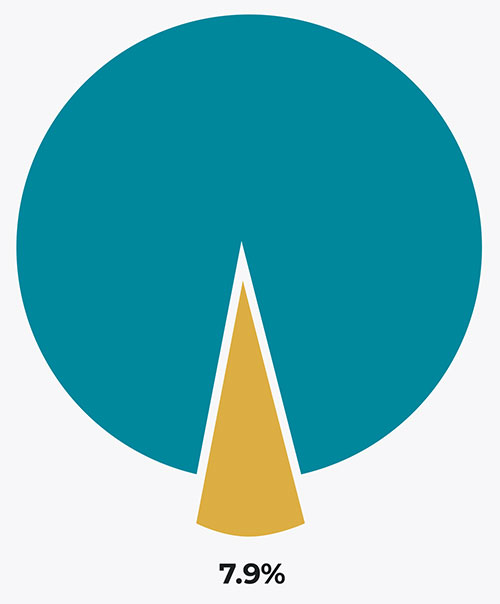CRC RISK MIGHT SEEM LOW, BUT THE DEATH RATE IS HIGH
The lifetime risk of colorectal cancer (CRC) in the Western world is approximately 4%. CRC represents 7.6% of all new cancer cases in the U.S., with 152,810 new cases estimated in 2024, making it the fourth most diagnosed cancer.1
Additionally, CRC is the second most deadly cancer affecting both men and women. In fact, an estimated 52,580 deaths were attributed to CRC in 2024. Various modifying factors, such as age, gender, ethnicity, physical activity, and dietary factors, can contribute to an increased risk of cancer.1,2
CRC IS THE SECOND MOST DEADLY CANCER
Colorectal cancer represents 7.6%
of all new cancer cases in the U.S.

“How Common Is This Cancer” was originally published by the National Cancer Institute.1
CRC SCREENING IS CRITICAL
The majority of colorectal cancers originate as adenomatous polyps, known as “adenomas.” A screening test is used to identify the presence of these precancerous polyps, with the intent of removing them before they turn into a cancer. There is strong evidence that increasing CRC screening rates will reduce CRC incidence and mortality.2-5
The U.S. Preventative Services Task Force now recommends CRC screening tests for all adults aged 45 or older. Colonoscopy is the gold standard among screening tests for CRC. Usually performed by a gastroenterologist, a colonoscopy allows for direct visualization of the colon and rectum and removal of polyps within the same procedure.3-5
Before undergoing a colonoscopy, patients are prescribed a combination of laxative agents to clean the colorectum so that the intestinal lining can be adequately examined. This is often called a “bowel prep”. The first bowel preps approved for colonoscopy required patients to ingest a large volume (4L) of poor tasting salt solution. More recent innovations, including low-volume and tablet bowel preps, have been designed to improve the patient experience while providing effective cleansing efficacy. Numerous studies have shown that 4L bowel preps are less tolerated by patients than low-volume bowel preps. Bowel prep intolerance can lead to lowered patient compliance, impacting cleansing efficacy.6-8
A highly effective bowel prep is critical for cleansing the colon and ensuring visualization of the colonic mucosa to allow identification and removal of adenomas. However, it has been reported that in up to 25% of colonoscopies, the colon is not adequately cleansed. This can be influenced by several factors, including the bowel prep or regimen used (e.g., one-day vs split-dosing) and patient non-compliance with the bowel prep, due to large volumes required or poor taste of some bowel preps. Ineffective cleansing can lead to repeat colonoscopies, and more importantly, can result in missed adenomas which can develop into cancer.6-8
PIONEERS OF PREP
Braintree, a part of Sebela Pharmaceuticals, has been an innovator in bowel prep products since 1984 with the introduction of GoLYTELY® (polyethylene glycol 3350 and electrolytes for oral solution), the first FDA-approved prescription bowel prep.
As the trusted market leader in bowel prep products, including SUFLAVE® (polyethylene glycol 3350, sodium sulfate, potassium chloride, magnesium sulfate, and sodium chloride for oral solution), SUTAB® (sodium sulfate, magnesium sulfate, potassium chloride) Tablets, and SUPREP® Bowel Prep Kit (sodium sulfate, potassium sulfate and magnesium sulfate) Oral Solution, Braintree is engaged in developing safe and effective bowel preps that continue to improve the patient experience and reduce barriers to CRC screening.
Braintree’s development process includes extensive formulation work to ensure all bowel preparations are electrolyte balanced. This is critical to maintaining patient safety and mitigating the losses and gains of important electrolytes that can occur during the preparation process. The safety and efficacy of Braintree bowel preparations are then confirmed in large, randomized, controlled Phase 3 clinical trials. All Braintree bowel preparations have undergone rigorous review by the FDA to gain approval (unlike OTC laxative combinations repurposed for off-label use).6
References
1. National Cancer Institute. Cancer stat facts: colorectal cancer. Available at https://seer.cancer.gov/statfacts/html/colorect.html. Accessed November 25, 2024.
2. Øines M, Helsingen LM, Bretthauer M, et al. Epidemiology and risk factors of colorectal polyps. Best Pract Res Clin Gastroenterol. 2017;31(4):419-424. doi: 10.1016/j.bpg.2017.06.004
3. Shaukat A, Kahi CJ, Burke CA, Rabeneck L, Sauer BG, Rex DK. ACG Clinical Guidelines: Colorectal Cancer Screening 2021. Am J Gastroenterol. 2021 Mar 1;116(3):458-479. doi: 10.14309/ajg.0000000000001122. PMID: 33657038.
4. US Preventive Services Task Force. Screening for Colorectal Cancer: US Preventive Services Task Force Recommendation Statement. JAMA. 2021;325(19):1965–1977. doi:10.1001/jama.2021.6238
5. Rex DK, Boland CR, Dominitz JA, Giardiello FM, Johnson DA, Kaltenbach T, Levin TR, Lieberman D, Robertson DJ. Colorectal Cancer Screening: Recommendations for Physicians and Patients from the U.S. Multi-Society Task Force on Colorectal Cancer. Am J Gastroenterol. 2017 Jul;112(7):1016-1030. doi: 10.1038/ajg.2017.174. Epub 2017 Jun 6. PMID: 28555630.
6. Johnson DA, Barkun AN, Cohen LB, Dominitz JA, Kaltenbach T, Martel M, Robertson DJ, Boland CR, Giardello FM, Lieberman DA, Levin TR, Rex DK; US Multi-Society Task Force on Colorectal Cancer. Optimizing adequacy of bowel cleansing for colonoscopy: recommendations from the US multi-society task force on colorectal cancer. Gastroenterology. 2014 Oct;147(4):903-24. doi: 10.1053/j.gastro.2014.07.002. PMID: 25239068.
7. ASGE Standards of Practice Committee, Saltzman JR, Cash BD, Pasha SF, Early DS, Muthusamy VR, Khashab MA, Chathadi KV, Fanelli RD, Chandrasekhara V, Lightdale JR, Fonkalsrud L, Shergill AK, Hwang JH, Decker GA, Jue TL, Sharaf R, Fisher DA, Evans JA, Foley K, Shaukat A, Eloubeidi MA, Faulx AL, Wang A, Acosta RD. Bowel preparation before colonoscopy. Gastrointest Endosc. 2015 Apr;81(4):781-94. doi: 10.1016/j.gie.2014.09.048. Epub 2015 Jan 14. PMID: 25595062.
8. Wexner SD, Beck DE, Baron TH, Fanelli RD, Hyman N, Shen B, Wasco KE; American Society of Colon and Rectal Surgeons; American Society for Gastrointestinal Endoscopy; Society of American Gastrointestinal and Endoscopic Surgeons. A consensus document on bowel preparation before colonoscopy: prepared by a task force from the American Society of Colon and Rectal Surgeons (ASCRS), the American Society for Gastrointestinal Endoscopy (ASGE), and the Society of American Gastrointestinal and Endoscopic Surgeons (SAGES). Gastrointest Endosc. 2006 Jun;63(7):894-909. doi: 10.1016/j.gie.2006.03.918. Erratum in: Gastrointest Endosc. 2006 Jul;64(1):154. PMID: 16733101.